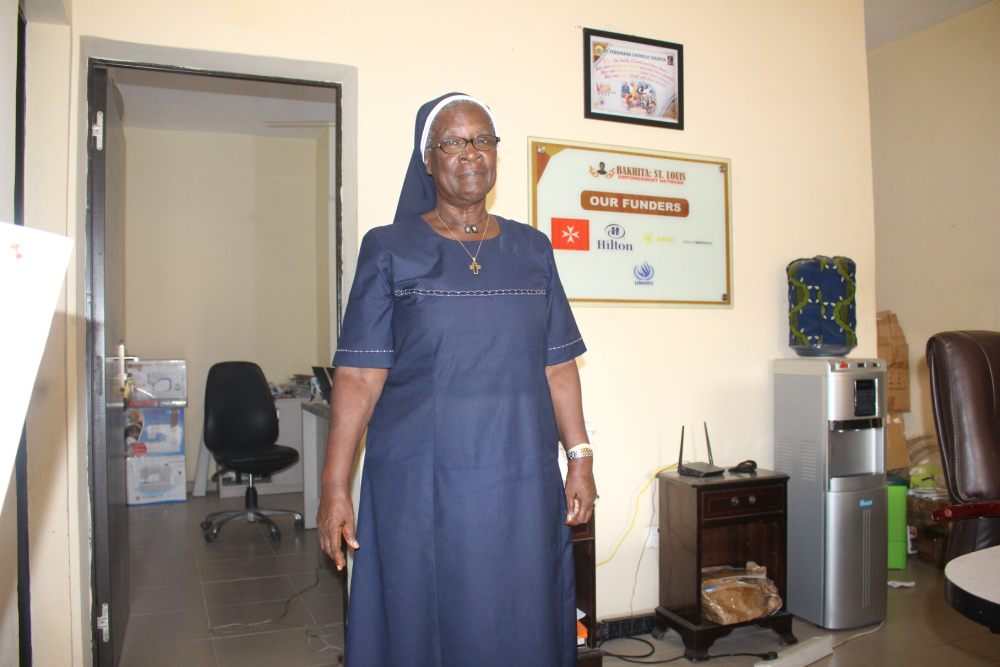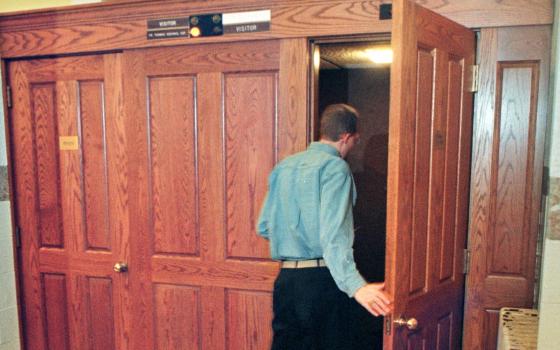
St. Louis Sr. Patricia Ebegbulem has dedicated 20 years to combating human trafficking. For her, it is a call to serve and "restore the dignity of women who have been trafficked and have returned to Nigeria." She manages Bakhita Villa, a shelter located in Lagos, Nigeria. (Valentine Benjamin)
St. Louis Sr. Patricia Ebegbulem has dedicated 20 years to combating human trafficking. For her, it is a call to serve and "restore the dignity of women who have been trafficked and have returned to Nigeria."
She manages Bakhita Villa, a shelter located in Lagos, Nigeria's bustling commercial city where survivors of human trafficking — whom she affectionately calls her "treasures" — find refuge along with rehabilitation, spiritual support, medical care and counseling programs designed to help them rebuild their lives.
The shelter was named in honor of St. Josephine Bakhita, a former slave girl from Sudan rescued from human trafficking in Italy in 1885.
Ebegbulem was born on March 19, 1945, in Ahiara, a town in Ahiazu Mbaise Local Government Area of Imo State, Nigeria. She joined the St. Louis sisters at 19 and began her novitiate in the city of Akure while working as a grade two teacher in 1964.
Before she became a passionate advocate against human trafficking, Ebegbulem served as the provincial superior of her congregation in Nigeria. She also held the position of National President of the Nigeria Conference of Women Religious, and the Committee for the Support of the Dignity of Women was founded during her leadership.
"My congregation supported my desire to dedicate myself fully to combating human trafficking, recognizing my unwavering commitment and passion," she said.
For decades, Nigeria has remained in the news for being a source, transit and destination country for human trafficking. Countless citizens have been trafficked to Europe, Asia, the Middle East and other parts of Africa, where they are subsequently exploited.
In May, news broke about 78 victims, including girls and women ages 13-30, who were rescued after being trafficked to Ivory Coast. Between May 2021 and May 2025, over 1,500 Nigerian girls have been repatriated to Nigeria, according to Michael Onwuchekwa, President of the Nigerian Community in Ivory Coast.
Ebegbulem spoke to Global Sisters Report about her work and passion for fighting human trafficking.
GSR: How would you describe human trafficking in Nigeria?
Ebegbulem: Human trafficking has significantly deepened the negative global perception of Nigeria. With a population exceeding 200 million, Nigeria is home to many skilled professionals, yet this disturbing issue overshadows the positives. While numerous Nigerians achieve success in various fields, the stigma of human trafficking casts a long shadow over our image.
This horrific crime has further slowed down development in our communities and cities. We find ourselves stuck in a cycle of ineffective leadership, as those who could truly make a difference often fall victim to exploitation. Real progress isn't about recycling leaders; it's about advancing. Sadly, Nigeria appears to be regressing, primarily due to the lack of empowerment for our youth. This feeling of desperation drives many down dangerous paths, including trafficking, drug abuse and crime. It's genuinely disheartening.
Advertisement
How personal is your fight against human trafficking?
The fight against human trafficking is deeply personal for me because of my passion for the cause. I tend to get emotional about these issues, and that emotion illustrates how much it all means to me.
In the past, particularly during my travels to Italy, I witnessed a lot of suffering, especially among young girls — the future of any nation. I couldn't help but think that if things continue as they are, young men may struggle to find decent partners to marry, given how many young women were being trafficked or even trafficking themselves. This realization fueled my passion and ignited a sense of urgency within me.
Working with a group of Catholic sisters from Nigeria, we all felt a profound sense of pain witnessing the harsh realities. We traveled to various cities in Italy —Rome, Turin, Venice —and came face-to-face with the heartbreaking sight of our girls, often found half-naked in the streets. It became clear that we had to take action.
That's when it became personal for me. I made a commitment — Patricia, you have to do something about this. With the blessing of my congregation and in collaboration with other devoted sisters, we were determined to address this terrible menace, a scourge damaging our society and destroying the lives of our young people. This deep commitment spurred me into action.
Nigeria became a signatory to the United Nations Convention against Transnational Organized Crime (also known as the Palermo Convention) on December 13, 2000. Has this agreement aided Nigeria in battling human trafficking?
Absolutely. The signing of this protocol has had a positive impact. Thanks to influential figures like Mrs. Titi Atiku, whose husband was the vice president at the time, and Mrs. Eki Igbenedion, whose husband was the governor of Edo State then. These partnerships helped Nigeria legislate against human trafficking, which led to the establishment of the National Agency for the Prohibition of Trafficking in Persons (NAPTIP).
NAPTIP has become Nigeria's response to human trafficking and is doing important work in this fight. However, challenges remain due to systemic issues within the country. Unfortunately, many of the zonal commanders at NAPTIP often rely on their personal resources to carry out their mission, as funding is inadequate due to prevalent corruption. It's disheartening to see that they don't receive the budget allocations intended for them, which severely limits their effectiveness.
Late Pope Francis declared that an economy without human trafficking is an economy with "market rules that promote justice." How does this resonate with your work at the Bakhita Villa in Lagos?
It was uplifting when the late Pope Francis, during the feast day of Saint Josephine Bakhita — who was herself sold into slavery — called for an economy free of human trafficking. His message resonates with our ongoing efforts and reinforces the necessity of this mission.
Human trafficking stands in stark opposition to justice and human rights. I recall during our meeting in Rome in 2019, the then-Pope told us to "go home." By "us," I refer to Talitha Kum — a global network of consecrated Catholic sisters from every corner of the world.
Talitha Kum represents countries of destination, transit and origin, forming a comprehensive gathering focused on this issue. The Pope recognized that he was addressing a global assembly and urged us to speak out against the commodification of human beings, particularly children, who are created in the image and likeness of God. These individuals should never be treated as commodities that can be bought, used and discarded at will.
This connection with the Pope's message resonates profoundly with us because justice is at the core of everything we do here.
How many girls have you helped rehabilitate so far?
We've helped around 220 girls since 2009.
As a sister, taking on an organized crime network can be daunting, especially one worth billions of dollars.
It can be overwhelming. However, various factors have fueled my motivation. My initial encounter with the victims in Italy had a profound impact on me. I was deeply moved when the sisters there invited us to meet our girls. I couldn't hold back my tears upon seeing how battered and shattered they were, treated like mere commodities.
That experience inspired me to get involved in this work. Witnessing our success stories has also been incredibly motivating. We refer to the girls — not as victims or survivors — but as treasures. Many are now happily married, pursuing higher education, or running their own businesses and employing others.
These successes give me hope.




